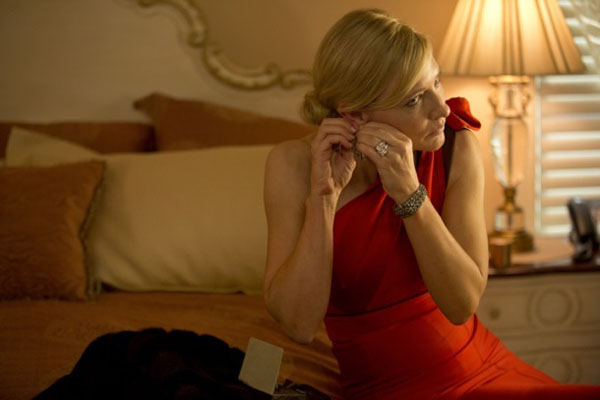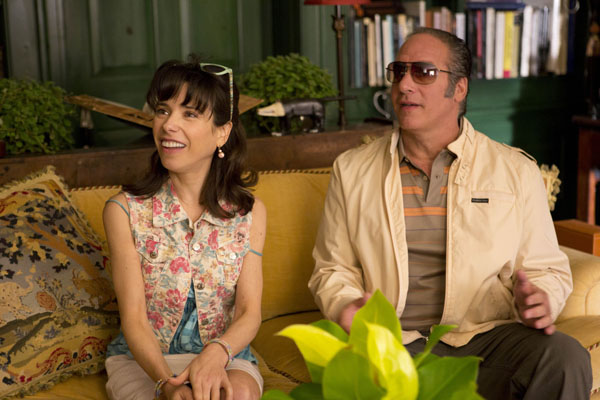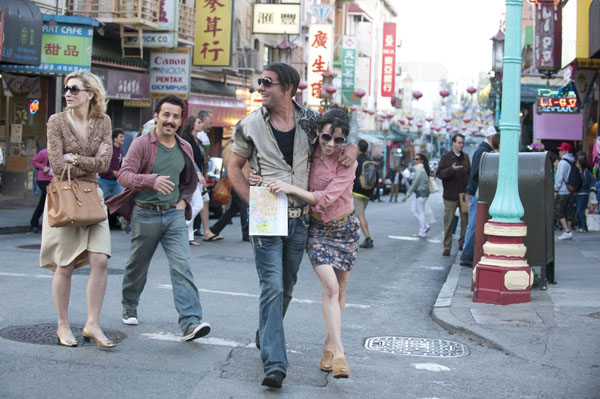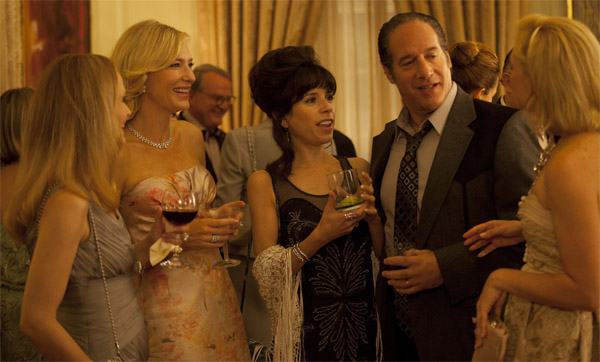“San Francisco has been good to Woody Allen, from his 1969 directing debut with Take the Money and Run to his lead turn in 1972′s Play It Again, Sam, and a long-overdue return visit provides just the shot of artistic adrenaline he needs in Blue Jasmine,” begins Justin Chang in Variety. “Following the frivolities of Midnight in Paris and To Rome With Love, Allen makes an invigorating return to American soil with a meaty, fully realized drama that cleverly functions as both an update of A Streetcar Named Desire and a satire on One Percent excess.”
“Jasmine, a fallen New York socialite played by Cate Blanchett, is left emotionally brittle by the deceptions of her husband (Alec Baldwin), a philanderer and a financial huckster,” writes Dave Itzkoff in the New York Times. “Having fled to San Francisco to start anew, she is oblivious to the calamities that have stripped her of her station. She continues to be obsessed with class, status and luxury brands, and knows how to pronounce the name Louis Vuitton for maximum annoyance. For all the illusions torn away from her by the end of Blue Jasmine…, she stands as his latest distinctive female character in a roster full of them. In the span of more than 40 of Mr. Allen’s films, including Annie Hall, Hannah and Her Sisters, and Vicky Cristina Barcelona, strong and memorable women have become as much a hallmark of his movies as the venerable Windsor font in their credits.”
It so happens that, after a string of notable interviews with Woody Allen—see, for example, Charles McGrath‘s for WSJ Magazine and Mark Olsen‘s for the Los Angeles Times—the one on everyone’s virtual lips today is Itzkoff‘s. Woody’s told him that he’d “love to do a movie with him and me, a comedy,” the “him” being Louis C.K., who has a smallish role in Blue Jasmine. Woody’s also been “toying with the idea” of putting together another stand-up routine.
But back to the film at hand. “Although marred by a couple of too-convenient plot contrivances, this often humorous drama lands firmly in the plus column among the Woodman’s recent works,” finds the Hollywood Reporter‘s Todd McCarthy. Blanchett is a “tour de force,” but: “Woody Allen and Andrew Dice Clay, whoda thunk it? In fact, the lugs in the life of Jasmine’s lower-class sister [Sally Hawkins] are played by Clay, Bobby Cannavale and Louis C.K., which contributes a vivid emphasis on class and financial distinctions that doesn’t usually enter Allen’s field of vision.”
TheWrap‘s Leah Rozen suggests that Blanchett is “playing what Blanche [Dubois] might be if she lived today and was part of the Upper East Side-Hamptons set but had started out poor, ended up rich and then lost it all again…. The problem with the film is that no other character in Blue Jasmine registers as strongly as Jasmine or seems nearly as well drawn by Allen. There’s no domineering, earthy, wisecracking Stanley here to balance out Jasmine’s Blanche.”
“The more conventional and feel-good take on this material would be one of sisterly reconnection and discovery via these various, intertwined stories of romantic bloom and withering,” writes Brent Simon for Screen, “but Allen elides laborious whimsy and instead focuses on notions of reinvention (success is questionable) and romantic settling, via an engaging split structure that alternates between Jasmine’s lavish past and brought-low present. The basic discord Allen sketches is familiar (selfishness, disapproval over a family member’s significant other), but Blue Jasmine’s smiles and laughs flow mostly from a sense of pained social recognition rather than any patter.”
Updates: For Rodrigo Perez, writing for the Playlist, Blue Jasmine‘s “sharpest, most cutting salvos are looking straight at the ugly conditions of the human heart, our lies, compartmentalized delusions, and desperate coping methods. In this manner, Blue Jasmine vaguely resembles Husbands & Wives, but certainly filtered through Allen’s recent tendency to sift through and examine past heartaches and contrition.”
But “why must it be so uneven?” wonders Beth Hanna at Thompson on Hollywood.
Update, 7/19: Lily Rothman talks with Blanchett for Time.
Update, 7/21: 2.5 out of 4 stars from Nick McCarthy in Slant: “With Allen’s occasionally elegant flair for nuance and subtlety having nearly evaporated over the years, it’s clever for him to focus on a purely psychological character study, organically elaborating on his ideas from within instead of applying theses to hollow pawns in a highly calculated, hermetically sealed world a la Match Point. Even if Jasmine’s firmly established struggles with entitlement, aloofness, and delusion are pressed on throughout, Allen successfully builds a rather complete, complex portrait of a woman over the verge of a nervous breakdown; the gravitas of Jasmine’s insecure situation is informed by identifiable, desperate human behaviors as opposed to misogynistic affectations. Allen’s return to America is refreshing as well, allowing him the freedom to focus on the depth of his characters instead of becoming distracted by touristy travelogues built on flimsy scenarios.”
Updates, 7/22: At Film.com, David Ehrlich suggests that “in some respects, the period that began with 2004’s Melinda and Melinda has been Allen’s most fixedly auteuristic, the famously prolific filmmaker churning out ten consecutive stories that are each in some way consumed by thoughts of double lives and second chances. It seems that the Bronx Bumbler, so reverent of Bergman, has in his twilight years become enchanted by Kieslowski—his life story all but told save for the epilogue, Woody Allen has naturally began to look back and consider what might have been…. And so we arrive at Blue Jasmine, perhaps Woody Allen’s best film since 1994’s Bullets Over Broadway… When Allen conceives of a character this great, it’s hard not to wish for him to slow down and maybe write that extra draft to refine his creation, but Blanchett—at once both repellant and eminently relatable—uses the casual tone to her advantage, the same way that monster movies use miniatures for scale.”
“Allen, who’s now 77, has become flintier as he has got older,” finds David Denby in the New Yorker. “His men and women tell one another off; the social clashes among people from different ways of life can be harsh and unforgiving…. Allen’s camera is more active in this film than in his earlier work. He moves with the characters when they’re quarrelling and stays with them in continuous shots as physical violence erupts. The movie is curt and decisive—a ‘late’ style, if there ever was one.”
“If you know the work of Allen (or Streetcar), you can predict every pipe-dream-shattering confrontation—every turn, twist, and resolution,” suggests New York‘s David Edelstein. “But Baldwin and Michael Stuhlbarg as a shnooky dentist do much with their little, and you can never, ever predict Hawkins. She’s so much Blanchett’s opposite—raw, goosey, spontaneous—it’s no wonder Allen had to make them adopted sisters. She’s paired with three different actors: Andrew Dice Clay, surprisingly affecting as her first husband; Cannavale, who’s always entertaining but doesn’t rise above his sub-Kowalski part; and Louis C.K., who proves himself a sensitive actor even with lines that stop just at the point when in an episode of Louie they’d leap to the next level of poetic, cringeworthy self-revelation.”
Updates, 7/24: Blanchett’s Jasmine is Allen’s “least adjusted main character since Deconstructing Harry’s writer Harry Block, but without his creative outlet to fall back on,” notes Michael Koresky in Reverse Shot. “From the get-go, Jasmine is losing it, although our proximity to her, as the star of a Woody Allen film, leads us to believe in the essential adorability of her neuroses and therefore the possible reclamation of her selfhood. Blue Jasmine provocatively supposes that there may never have been a fully formed self to begin with.” This film “has the look and feel of the director’s more recent, airy adventures, yet it offers the single-minded, grim fatalism of many of his eighties films, inarguably his golden era.”
“Allen has been working on his ‘late films’ for at least 15 years,” writes Miriam Bale in the L. “So that his latest film, Blue Jasmine, is a return to gnarly, emotional 80s Allen is a welcome surprise…. It’s about the guilt, trauma and retribution of finally accepting the obvious. And I think it’s his first film dealing head on with the aftermath of the Mia Farrow divorce.”
For Salon‘s Andrew O’Hehir, though, “Allen’s storytelling has become lazy and contrived,” and “his perception of social and cultural geography is based, at best, on decades-old stereotypes,” so that “the whole experience of watching casts of talented and over-eager actors try to make sense of his nonsensical scripts becomes increasingly strained and bizarre.”
And for the Voice‘s Stephanie Zacharek, “Blue Jasmine is so relentlessly clueless about the ways real human beings live, and so eager to make the same points about human nature that Allen has made dozens of times before, that it seems like a movie beamed from another planet.”
5 out of 5 stars from Time Out New York‘s Joshua Rothkopf, who asks, “has Allen, the most painfully self-aware of American directors, ever allowed his fantasizers to fall on the rocks as ruinously as Cate Blanchett does in Blue Jasmine? I don’t think so…. The essence of Blue Jasmine feels timely, even years into America’s limp rebound from recession: How do we start over, when guilt can’t be fully processed and sacrifice is demeaned?… We remember Crimes and Misdemeanors (which this film most resembles in tone); now here’s a savage prosecution of the 1 percent. It’s not the movie anyone could have expected—which is stunning in itself. But maybe the time for sweet self-delusions is through.”
This is “Allen’s weightiest film in years,” agrees Emma Myers, writing for Film Comment.
“Why is it that each ‘new’ Woody Allen seems like a play written centuries ago?” asks David D’Arcy at Artinfo.
For Ioncinema‘s Nicholas Bell, “surpassing all potential squabbles, even all the trappings of Woody Allen himself, is an incredible central performance from Cate Blanchett.”
And Flavorwire‘s Jason Bailey passes along “All the Great Stuff Louis C.K. Said at the Blue Jasmine Press Conference,” while BlackBook‘s Hillary Weston reports on what the other cast members had to say on Monday.
Updates, 7/26: For the NYT‘s Manohla Dargis, Blue Jasmine is Allen’s “most sustained, satisfying and resonant film since Match Point,” and at RogerEbert.com, Susan Wloszczyna agrees. Dargis: “Whatever his inspiration, he has been rummaging around in the classics for decades, so his appropriation of Streetcar doesn’t surprise. What does is his reimagining Blanche by way of another figure who changes depending on how you hold her up to the light, Ruth Madoff, the wife of Bernard L. Madoff, the investor turned avatar of a fallen world. It’s a masterly stroke that puts Jasmine’s dissembling into fresh, chilling perspective.”
“There’s something admirably perverse about a movie that casts Andrew Dice Clay as the most upstanding character on screen,” suggests Ben Kenigsberg at the AV Club.
“In a performance that at times recalls, without embarrassment, Gena Rowlands in A Woman Under the Influence, Blanchett plays Jasmine as a woman on the verge of becoming incapable of living in the world,” writes Keith Phipps at the Dissolve.
“Allen observes Jasmine’s allure and disease without penetrating her soul,” finds Time‘s Richard Corliss. “That makes for a movie that is both intimate and disinterested, as if Jasmine were a flailing insect in a barren terrarium.”
For the New Yorker‘s Richard Brody, “the very dramatic power, the overwhelming compassion for Jasmine at her moments of intimate devastation, gets in the way of Allen’s strongest and most dangerous vision. Jasmine has lost her public identity—indeed, has become something of a pariah. She has lost her money, and she has to find something to do. Like Jasmine née Jeanette, Allen, of course, also endured (in the early 90’s) the shattering of his public identity and a barrage of hostility; like her, he was rejected by one of his children in the wake of scandal…. But Allen didn’t lose his money and he didn’t lose his ability to work; he didn’t struggle and strive to recover his former status, because he was able to simply keep going forward—and the artistic results have often been wondrous.” And this one is “among his most moving works.”
David Poland interviews Andrew Dice Clay
Towards the end, notes Slate‘s Dana Stevens, Jasmine has “become the kind of lady who walks around mumbling in a chic Chanel jacket, her mordant invective comprehensible only to herself. I doubt the director meant for Jasmine to be his stand-in at that moment, but I couldn’t help seeing the resemblance.”
“Blue Jasmine might be Allen’s cruelest film ever, which is saying something, since this is a director who’s never been particularly generous toward his characters,” writes Bruce Handy for Vanity Fair. “I saw sadism in it, beyond the usual misanthropy.”
For David Thomson, writing in the New Republic, Blue Jasmine “seems to me the best film he has ever made.”
Thinking at Film.com of Blue Jasmine in light of Another Woman (1987) and Alice (1990), Daniel Walber writes: “In the late 1980s, Allen was interested in the Manhattan housewife because she was the perfect conduit for his airier European-inflected themes. Now, with his return to a post-Madoff, recession-torn New York City, this figure has become the dynamic, crucial protagonist she perhaps should have been in the first place.”
Updates, 7/29: Nathan Rabin, Tasha Robinson, and Matt Singer discuss Jasmine, Woody, and more at the Dissolve.
Meantime, Jasmine‘s “scored the biggest box-office debut of the filmmaker’s career this weekend,” reports Amy Kaufman in the Los Angeles Times. In short, it has the potential to become an even bigger hit than Midnight in Paris.
Updates, 7/31: “The comedy and the drama rest uneasily, suggesting, as in much of the sheltered 77-year-old director’s late work, that he’s always going to be two or three screenplay drafts shy of any possibility of nearing goodness, let alone greatness,” writes Ray Pride for Newcity Film. “Yet, still. Jasmine’s is a cautionary virago for anyone who’s ever witnessed a friend unknowing muttering to themselves just within earshot, just within the frame of reality. Jasmine’s headlong fall is fearsome, lugubrious, and ultimately, exasperating. I’ll take my lunch elsewhere, thank you.”
For the Dennis Harvey, though, Blue Jasmine is “Woody Allen’s best movie in years.” Still, writing in the Bay Guardian, he also finds it “somewhat disappointing that Blue Jasmine doesn’t really do much with San Francisco. Ginger lives in a nondescript neighborhood (near the start of South Van Ness). There are no gay characters, racial diversity is limited to background players, and good as they are, Cannavale and Clay have the kinds of personalities that yell ‘Jersey!’ and ‘Brooklyn!,’ respectively. There are a few shots nodding at the colorful, pretty, touristy side of the city, but that’s not the world Ginger lives or that Jasmine lands in. Really, the film could take place anywhere—although setting it in a non-picture-postcard SF (despite the warm tones of Javier Aguirresarobe’s cinematography) does bolster the film’s unsettled, unpredictable air.”
Tim Walker in the Independent: “Blue Jasmine is proof that Allen’s powers are merely fluctuating, not in terminal decline: it’s his most assured, affecting work in years.”
Updates, 8/2: “Blue Jasmine represents Allen’s coming-out film, by virtue of placing his class anxieties front and center, not through embarking on any themes that are significantly new for him,” argues Jonathan Rosenbaum. “The vague use of A Streetcar Named Desire (movie and play) as a loose model… parallels the vague uses of A Place in the Sun and An American Tragedy in Match Point…. But it’s important to add that the feelings of danger and even horror that we associate with Tennessee Williams and Theodore Dreiser are at most only sketched and suggested here, and kept at arm’s length, not made real enough to threaten or frighten us. Maybe that’s the secret of Woody Allen’s middle-brow and middle-class prestige: even when his characters are most desperate, as they are here, his films always feel absolutely safe.”
“Blue Jasmine is bad in ways that Allen’s movies have been bad for at least two decades,” writes Ben Sachs in the Chicago Reader. “It’s too clearly enamored with well-to-do lifestyles to offer a meaningful critique of them. The psychological insights feel like hand-me-downs from other movies: Hawkins seems to have been cast to inspire memories of her performance in Mike Leigh’s Happy-Go-Lucky; the portrait of upper-class hypocrisy (as in Allen’s Match Point) recalls numerous films by Claude Chabrol. Most uncomfortably, Allen seems to have no idea how contemporary working people talk and behave.”
For the San Diego City Beat‘s Glenn Heath Jr., though, if Blue Jasmine “were simply a study of an entitled socialite getting her comeuppance, it would be quite a dull bird. The film’s real genius stems from its ability to survey different stages in Jasmine’s descent toward madness, from denial to acceptance to isolation and back again.”
But the Atlantic‘s Christopher Orr argues that “Blanchett, and Blue Jasmine itself, are let down by Allen’s script and direction. Though the film sets itself loftier goals than most of his recent works, it shares with them an unfinished quality, as if it were the first draft of a better work that wasn’t given the time and attention to come together.”
David Poland interviews Cate Blanchett
“Much more successfully than Match Point—and I’d argue any Allen joint since Crimes and Misdemeanors—Blue Jasmine finds the director suppressing his chronic gag reflex in favor of a more stringent sensibility,” writes Adam Nayman for Cinema Scope. “For the most part, it works…. What Blue Jasmine lacks in imagination about its working-class characters—gentle dupes—it makes up for in contempt for the white-collar criminals spending their money. It’s precisely this sense of contempt that makes Blue Jasmine a little more bracing than Allen’s usual, even if it also marks a clear disconnect between Allen and his literary influence du jour. Ever a tender tormentor of his characters, Williams demonstrated compassion for Blanche without dulling his knife-edged insights into her narcissism and weakness. Allen regards Jasmine with at best wary bemusement… and more generally with revulsion… Blanchett goes all in on the performance, recalling not so much Vivien Leigh’s tremulousness in Streetcar but the brittleness of Judy Davis in Allen’s acidic Husbands and Wives (1992).”
Update, 8/4: “Allen is not overly optimistic about anyone’s morality,” writes Stuart Klawans in the Nation, “and yet it’s fair to say he seldom dwells on chicanery as a systemic problem of the kind that was exposed in the 2008 financial crisis and the Bernie Madoff affair. In that sense, Blue Jasmine is a departure for him. I can’t credit Allen overmuch for acknowledging, at this late date, a culture of criminality too blatant to ignore; but I admire, and am moved by, his decision to look at his new subject obliquely, through the experience of an enabler of the crimes: a woman who is fully individuated as a character and yet exemplary of the privileged class from which she has now been drummed out.”
Updates, 8/9: Matthew Sorrento for Film International: “In recent interviews, Woody admits that he continues making films out of guilt—that if he were to follow his true passion, to write novels at his own pace, he’d feel haunted by what he should be doing. Let’s rejoice that his guilt results in such palpable emotions for us all.”
Speaking of interviews with Woody, Cal Fussman‘s conducted the latest. For Esquire.
“The Ginger subplot may seem predictable,” writes Josef Braun, “but it also feels alive, thanks in part to the nuance and urgency brought to it by Hawkins and Cannavale, and by Andrew Dice Clay giving a shockingly strong performance, and Louis C.K., who’s wonderful, not emphatically funny but a welcome breath of fresh air at the film’s musty midpoint. He’s one of those actors who should be working with Allen as much as possible.”
Update, 8/12: “Allen’s depicted the frustrations of blocked authors and filmmakers before—this is in one sense all that he depicts,” writes Joseph Jon Lanthier in the Notebook. “But none has been so pathologically inclined toward narrative clumsiness as Jasmine, who’s further unfettered by the artistic aspirations that complicate these earlier characters’ lack of talent.”
Update, 8/14: “One need not have studied The Joke and Its Relation to the Unconscious to understand that behind all of Allen’s jokes about how we are all going to die is a decidedly un-funny fear of death, because he is all too happy to spell it out, explicitly, ponderously, pretentiously, insufferably, in his films and in interviews surrounding his films,” writes Marc Tracy for the New Republic. “While this portentiousness has been the engine of his best films (and has probably driven his entire, 60-year career as a comic, writer, and director), it now drags down an otherwise accomplished late period that should be an unmitigated triumph and capstone.”
Update, 8/16: “[T]hinking about Blue Jasmine reminded me of what I’d found disturbing about Allen’s earlier films: Annie Hall (1977), Manhattan (1979), Stardust Memories (1980), and Celebrity (1998),” writes Francine Prose for the New York Review of







